Your visit to hospital
Coming to hospital can feel unfamiliar and a bit scary. But there’s lots of information here to help you know what to expect.
During your visit, if there is anything you need to know or feel uncertain about, don’t be afraid to ask. Learn how to find your way around the hospital.
Coming for an appointment
When you visit us for an appointment but don’t need to stay the night, you will be an outpatient.
You and your parents or carers should tell someone that you have arrived at hospital. Then you may need to wait for your appointment.
While you wait, you can play, read or watch TV. There are games consoles and TVs on the ground floor, in the waiting area.
At your appointment, the nurse may need to check your weight, height, temperature, heart rate and blood pressure. You may also need some other tests. Your nurse will tell you about them.
When you see the doctor, the doctor will ask you and your parents or carers how you are feeling. You can ask any questions you may have. They may want to examine the part of your body that isn't working as it should be.
Coming to stay
If you are coming to Evelina London to stay the night, you will be an inpatient.
You and your parents or carers should tell someone that you have arrived. The receptionist will tell you where to go.
During your stay, you may need to see doctors, nurses and other hospital staff. Everyone you meet will tell you who they are and what they do. They will be happy to answer your questions about your care.
When you arrive, a nurse will show you where to go and tell you what will be happening that day.
If you're coming to have an operation, you might find our film about what will happen on the day of your operation will help you to prepare.
Your place
You will stay on one of our wards. You might have your own room or you might share a small area with other patients like you.
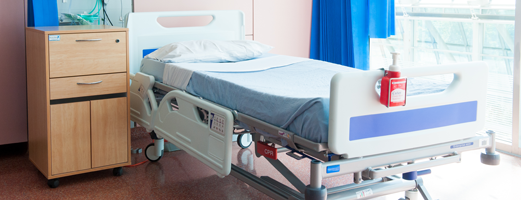
By your bed, you will have a cupboard to keep your things in. The bed will have curtains that you can pull round if you want to have some privacy.
At your bed, you will have a personal TV, radio and phone. You will also have a light and a call button in case you need the nurse to come over.
Your parents or carers can stay with you at any time. In fact, they may have a bed next to yours or in a room close by. Friends and family can visit until 8pm every evening.
Close to your bed, there will be a toilet and a bathroom. There is also an entertainment area on every ward. A nurse will show you where the nearest one is.
Food and drink
At Evelina London, our chefs make great, fresh food every day. It might be a bit different to the food you eat at home but we will try to find something that you like.
Find out about what our patients have to say about meals at Evelina London:
Well you get breakfast around 9 or 9.30. You usually get cereal but you can pick what you want, it’s really nice.
Around 12 you get lunch so you can get mashed potato or chips.
I actually think it’s really nice once you get used to it.
There’s a menu every day, you can choose the menu or you can get someone to come and get you some food.
Also they do, if you don’t like hot food, there are snack boxes available which are like sandwiches.
They have fruits, yoghurts, you know the usual.
You get dinner around 5 which is a bit early.
They have pretty nice puddings, usually a warm sponge and custard which are pretty decent.
Breakfast comes round on a trolley at about 8am. There’s cereal, toast, fruit and yoghurts. You can choose what you like.
Every day we will also give you a menu so that you can choose what you want for lunch and dinner. Lunch is at around 12 noon and dinner at about 5pm.
If you get hungry between meals or can’t find anything you like on the menu, just tell a nurse who will try to get you a snack or a different meal.
If there's a fridge on your ward you can bring in a few snacks and drinks to keep in it.
There is also a café on Ocean level and a juice bar on Beach level that makes great smoothies.
Who you might meet
There are lots of specially trained staff at Evelina London. They are all here to help you and other young patients get better and to answer any questions you may have about your care.
You may meet...
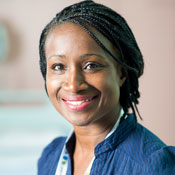
Doctors: they are trained to look after young people who come to the hospital.
You may see a consultant, who is a specialist doctor. You may also see doctors training in a particular speciality – they are called senior house officers (SHO) and specialist registrars (SpR).
Nurses are also specially trained to look after young people. They will check to see how you are feeling and help you if you need anything.
Different nurses wear different coloured uniforms.
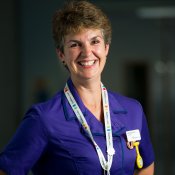 Matrons:
Matrons: they
are in charge of lots of different wards and departments and wear purple uniforms.
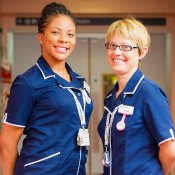 Sisters and charge nurses:
Sisters and charge nurses: they manage wards or departments and wear dark blue uniforms.
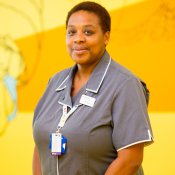 Clinical nurse specialists:
Clinical nurse specialists: they
are experts in particular illnesses and wear dark grey uniforms.
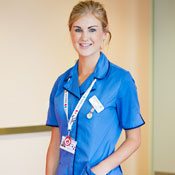 Staff nurses:
Staff nurses: they
work on wards and departments and wear light blue uniforms.

You might also see nurses wearing scrubs like these. This is because they work in theatres or surgical areas.
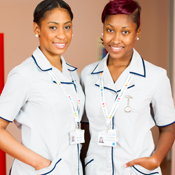 Nursing assistants:
Nursing assistants: they help the nurse to look after you by doing things like helping you get washed and dressed if needed. They wear light grey uniforms.
Occupational therapists: it can be difficult to get back to normal after being ill. Occupational therapists help you get used to doing everyday things again, like getting dressed, or doing your schoolwork.
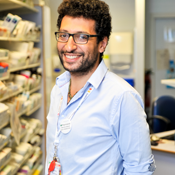 Pharmacists:
Pharmacists: they get any medicine you need ready for you.
Phlebotomists: they may take a little bit of your blood for us to test. They will make sure that you are as comfortable as possible while they take any blood.
Physiotherapists: they know all about how our bodies work and help us to move and keep active.
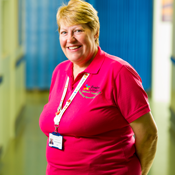 Play specialists:
Play specialists: they can provide you with support and help you to understand what is happening to you.
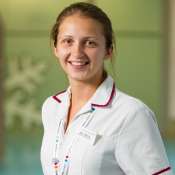 Radiographer:
Radiographer: they use machines like x-ray and MRI scanners to look at the inside of your body, to help us work out what's going on.
Speech and language therapists: you might see a speech and language therapist if you have problems talking or swallowing. They can help you with understanding language, speaking, eating and drinking.
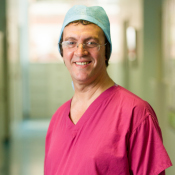 Surgeons:
Surgeons: they carry out operations. You might meet a surgeon if you're having surgery.
Anaesthetists: they put you to sleep when you have an operation and look after you during your surgery. They'll also wake you up after and make sure you're comfortable.
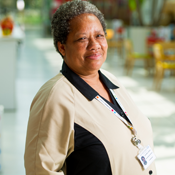 Housekeepers:
Housekeepers: they help to make sure the hospital is clean.
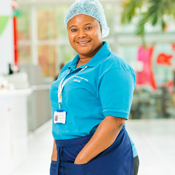 Patient service assistants:
Patient service assistants: they help the nurses look after you, by doing things such as serving meals and making beds.
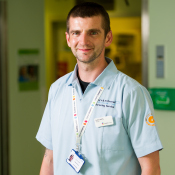 Porters:
Porters: they take you from place to place in the hospital if you need help getting around.
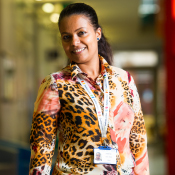 Receptionists:
Receptionists: they greet you when you arrive. They are usually the first people you see at Evelina London.
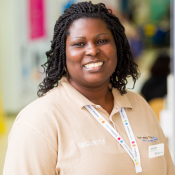 Security officers:
Security officers: they help keep Evelina London safe.
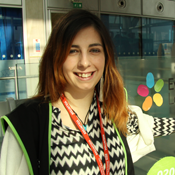 Volunteers:
Volunteers: they help out at the hospital. They do things like show families where to go when they come and visit, or keep you company while you're waiting.
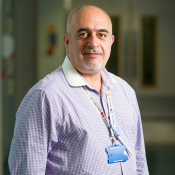 Ward clerks:
Ward clerks: they make sure our wards and departments run smoothly.
School staff: they are teachers who you might see in the hospital school.
Students: student doctors, nurses and other staff learn about how to care for children at Evelina London. Sometimes, your doctor or nurse may ask if it is ok for a student to stay in the room during your appointment. Please tell us if you don’t feel comfortable about this.